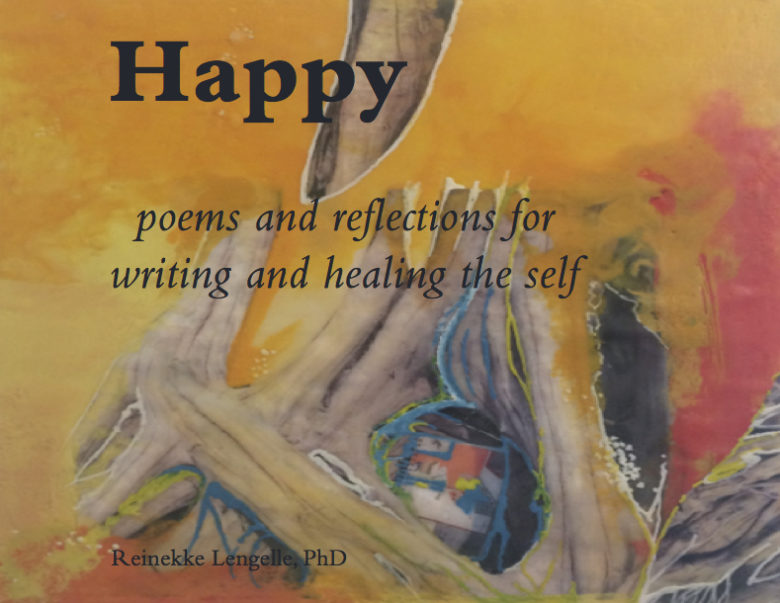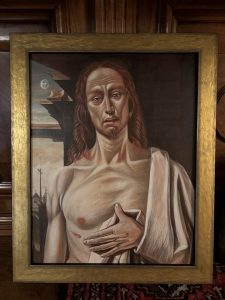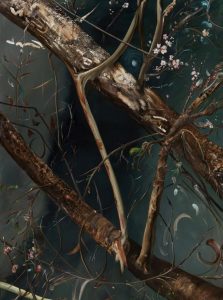The book “Happy” is ready to share.
Get in touch if you want to know more.
Here is a snippet:
The idea of Happy is to write poems and reflections that will inspire others to heal and write, or write and heal. The order doesn’t really matter. The reason for Happy’s combination of poem and explanation is that I myself am not a sophisticated reader of poetry. I have written poetry since childhood, yet I don’t feel I understand poetry well enough from anthologies or poetry books, unless someone like Kim Addonzio or Ted Kooser or Garrison Keillor is helping me along. I am a social scientist and write most of my poetry as a solo activity. As a reader, I notice I need some things spelled out and explained in the author’s own words. My students probably do too. I found this out by going to poetry readings where writers tell you why they wrote a piece, what irks them, what they have learned about life, and basically what the poem is about. I am truly grateful for these explanations and I can imagine that others might be as well.
This book also represents what I have learned about life so far, and I should have some wisdom by now, being rather close to 50. Actually, it is more accurate to say I want to share what I am in the process of learning because that is what is most alive for me at the moment. Perhaps my words will also be of some service to others and inspire courage. While some spend many hours learning how to paint, build decks, cook gourmet dishes, or plant awesome gardens, I have spent my life studying personal development, writing, and learning about the self. (I have unplanted strawberries on my deck as I write this to prove it. As you can well understand, I did not build the deck either and my garden is full of weeds.)
Happy is also inspired by my students. They have told me over the years that the act of writing has transformed their suffering into something life-giving. My students have written about many difficult things, including deaths of children and husbands, infertility, the loss of parents, the abuse suffered at the hands of parents, the pain of acrimonious divorce, the innocence damaged by affairs, chronic illness, depressions so severe there was almost no way of eating, and many other difficult things. They have brought their worries and their courage to my classroom for over twenty years.
You might be asking now, “Why all this dark and heavy stuff?” Well, research shows that good events require little integration, they happen, we appreciate them and they might confirm for us the goodness of life (important, to be sure) but they are not the experiences that tear us open or break us down so that we might break through.
It is a sad and funny truth about humans, that we often find our greatest learning opportunities through painful triggers. This is not to glorify pain: pain is simply there to wake us up, make us alert, motivate us to join life more meaningfully, and reduce our assholish way of being so sure about things. (Yes, you are allowed to create words, as long as they work. The spellchecker wants to make “astonish” out of “assholish” but I think they are opposites).
Another word for healing is integration: writing helps us to re-story and restore and in this way integrate life experience. It is an internal and external dialogue where we make sense of what happens to us and some of our identifications (stories about ourselves) will change or even disappear all together. The internal dialogue begins when we start to listen. Some people call this intuition, inner wisdom, the little wise voice, or that place deep down. I call it cultivating the “warm inner compass,” which I’ll talk about more in this book.
The invitation is to leave victimhood and victim consciousness behind, while respecting the feelings that first emerge as a result of triggers, life losses, and change. This leaving victimhood is not a simple matter as even our brains are wired to enjoy some level of (self)righteousness and (self)punishment. If you look at the matter carefully, you’ll see that a “poor me” stance is an understandable, yet insidious protection of a core narrative, which says, “I am innocent.” This desire to be seen and found innocent is an essential driver of humans, it has survival benefits in life as part of the herd, and its related stories are difficult to give up. It is indeed hard to admit, “I hurt my relationships through constant criticism” or “I am enabling my child’s addiction” or “All along, I have been waiting for other people to change…”
In Happy, Reinekke Lengelle, already well known for her work in expressive career-writing, shows how poetry can act as a mirror for our experience and offer insights into life’s dilemmas and challenges. She offers us a highly readable and personal account of how, in her everyday life, writing poems helped her to process her experiences. In an engaging, immediate style we move from the big questions of death and divorce to the daily challenges of intimate relationships and parenting. She invites the reader to travel with her – both into her own poems and also into our own parallel questions and issues. There are exercises and suggestions for writing based on tried-and-tested techniques she has developed with her many students. This is a generous and accessible approach to both poetry and the wider world of expressive writing and personal development. Victoria Field, Author & Poetry Therapist


